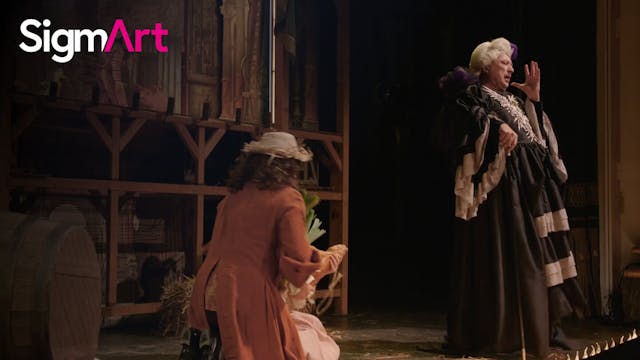MAM'ZELLE NITOUCHE Satiric Opera by Hervé
Comedy & Comic Opera
•
2h 6m
Language: French
Subtitles: English, French, German, Italian, Spanish
Mam'zelle Nitouche is a vaudeville-opérette in three acts by Hervé. The libretto is by Henri Meilhac and Albert Millaud. This story of a respectable musician, transforming himself into a songwriter at night, is partly inspired by the life of the composer of the piece Hervé, who as Florimond Ronger, his real name, was the organist at the important church of Saint-Eustache, Paris by day and wrote the music for and starred in satirical, irreverent operettas under a stage name at night.
Anna Judic created the role of Mam'zelle Nitouche. It was first performed at the Théâtre des Variétés, Paris on 26 January 1883. The piece was a great success and the work remained in the repertoire of French theatres for many years. Mam'zelle Nitouche was presented by Palazzetto Bru Zane in a production by Olivier Py, who also appeared in the cast, on a nationwide tour of France from 2017 to 2019.
The expression “Sainte Nitouche” (literally “(female) Saint Wouldn’t-Touch-It”) appeared for the first time in Rabelais’ Gargantua in 1534 and referred to a woman who appears innocent, wise and even prudish, yet who by nature defies morality and conventions in private. In the 19th century, the Sainte Nitouche took on the traits of the “emancipated” woman: from the dancer to the socialite, from the established bourgeoise to the simple peasant girl, every art form portrays the ambivalence between a strict upbringing and moral emancipation.
Even though it is not Hervé’s final composition, Mam’zelle Nitouche may be regarded as his musical testament, or at least his crowning achievement. The work, whose subject was based on the composer’s own life – a convent organist becomes a man of the theatre and composer of light music once night has fallen – skilfully blends the comic tone of the post-1870 period (as found in Lecocq, in particular), the spirit of café-concert revues and the breathless rhythm of the spoken theatre inherited from Labiche. Indeed, at its premiere in January 1883, the piece was entitled ‘comédie-vaudeville’, reflecting the central importance of its dramatic action, and the music was more specifically conceived to accompany witty comic ‘turns’ by soloists. The title role, in particular, is assigned a significant number of arias and duets to showcase the theatrical and vocal dynamism of Anna Judic, the first of a long series of stars to sing Mam’zelle Nitouche. The work’s success far surpassed Hervé’s hopes, and was prolonged in the twentieth century by a number of filmed adaptations, one of the last of which featured no less a star than Fernandel in the role of Célestin, originally played by Hervé himself. Mam’zelle Nitouche was translated into many languages, and is still present in the collective memory of older generations in Russia and Italy, for example.
Direction: Pierre-André Weitz (Stage direction), Jean-Philippe Clerc (Choir Director), Christophe Grapperon (Music Conductor)
Cast: Lausanne Chamber Orchestra, Lausanne Opera Choir, Olivier Py: The Superior / Corinne / Miss Knife / Loriot, Lara Neumann: Denise de Flavigny / Mam’zelle Nitouche, Damien Bigourdan: Célestin / Floridor, Samy Camps: Viscount Fernand de Champlâtreux, Eddie Chignara: The Major Count of Château-Gibus, Sandrine Sutter: La Tourière / Sylvia, Antoine Philippot: The Theater Director, Pierre Lebon: Gustave officer, David Ghilardi: Robert officer, Clementine Bourgoin: Lydie, Ivanka Moizan: Gimblette
Up Next in Comedy & Comic Opera
-
ATYS IN MADNESS Parody for Puppets by...
Language: French
Subtitles: English, French, German, Italian, SpanishA parody is above all a hilarious spectacle. The prodigious success of Atys parodies in the 18th century is based on the phenomenon of degradation; one of them, Atys travesti de Carolet (parody for puppets created at the Foire...
-
LE DEVIN DU VILLAGE Comic Opera by Je...
[Language: French]
Le Devin du village is the first success of Jean-Jacques Rousseau (1712-1778) in the field of opera. “Musical interlude in one act”, the work is composed over three weeks in the spring of 1752, on a libretto by Rousseau himself, then premiered at the court of Fontainebleau on ...
-
L'AFFAIRE TAILLEFERRE Opera Buffa by ...
[Language: French]
This 1955 radio work, composed by Germaine Tailleferre to a libretto by Denise Centore, brings together four minute operas: "La Fille d'opéra", "Le Bel Ambitious", "La Pauvre Eugénie" and "Monsieur Petitpois bous un château". Each one was written "in the manner of": Rameau, Ro...



